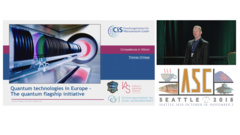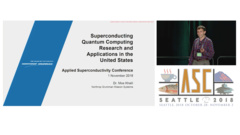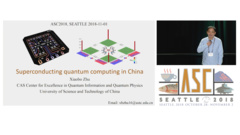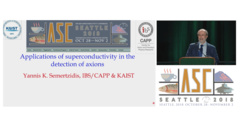The Prospects for Scalable Quantum Computing with Superconducting Circuits - Applied Superconductivity Conference 2018
Dramatic progress has been made in the last decade and a half towards realizing solid-state systems for quantum information processing with superconducting quantum circuits. Artificial atoms (or qubits) based on Josephson junctions have improved their coherence times more than a million-fold, have been entangled, and used to perform simple quantum algorithms. The next challenge for the field is demonstrating quantum error correction that actually improves the lifetimes, a necessary step for building more complex systems. At Yale Prof. Schoelkopf’s group and colleagues have been pursuing a hardware-efficient approach for error correction that relies on encoding information in a superconducting cavity, the so-called “cat codes.” With this approach, the Yale group has applied real-time measurements and feedback to achieve the first extension of the lifetime of a quantum bit through error correction. For scaling, an attractive approach is the modular architecture, in which small quantum processors are networked together using microwave signals on superconducting transmission lines. This presentation will describe the first implementation of a teleported C-NOT gate, which is a key building block for the modular approach.
Dramatic progress has been made in the last decade and a half towards realizing solid-state systems for quantum information processing with superconducting quantum circuits. Artificial atoms (or qubits) based on Josephson junctions have improved their coherence times more than a million-fold, have been entangled, and used to perform simple quantum algorithms. The next challenge for the field is demonstrating ...
 Cart
Cart Create Account
Create Account Sign In
Sign In






